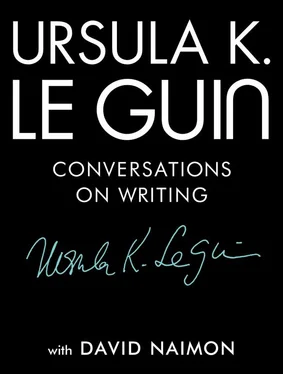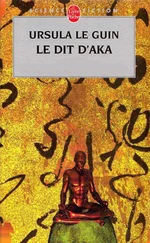UKL:Probably that piece is as near to autobiography as I’m going to come. It goes back to my childhood, to a house that I left when I was seventeen, though I stayed there as a visitor for many years. So I was thinking back a long way—part of what is going on is an old woman exploring her childhood. What about this place where I lived, which simply was home, the universe for me when I was little? I was trying to explore what it was like, the ramifications and meanings of that, how that house shaped me. And I know it did. And then there was the simple pleasure of writing about this house that I loved so dearly. Being there and thinking about it.
FROM
“Living in a Work of Art”
• • •
I don’t know what novel our Maybeck house could be compared to, but it would contain darkness and radiant light; its beauty would arise from honest, bold, inventive construction, from geniality and generosity of spirit and mind, and would also have elements of fantasy and strangeness.
Writing this, I wonder if much of my understanding of what a novel ought to be was taught to me, ultimately, by living in that house. If so, perhaps all my life I have been trying to rebuild it around me out of words.
DN:You grew up in a house built by a remarkable architect, Bernard Maybeck. One of the things that struck me in reading this essay about it was how you talked about the house being built in anticipation of its future inhabitants, as if the imagination of the architect is creating a space for people he hasn’t yet met.
UKL:When Maybeck planned a house he was imagining the family that might live in it. He was not designing a “machine for living,” or expressing his ego, as so many architects do and are praised for doing. He was doing anything but, and yet “Maybecks” are instantly recognizable. One thing I didn’t know when I started writing the essay was that Maybeck had expressed himself so clearly about what he saw as his goals as an architect. It was very useful to me, very interesting, and I hadn’t known it. He was a quiet person. The ego was not huge and formidable the way it is with the “star-chitects,” as they call them.
DN:We’ve talked before, when we were talking about fiction and poetry, about the role of the ego, the role of the intellect being secondary, in service of something more mysterious. We talked about the deeper meaning of the words, beyond their definitions, the meaning that comes from the syntax, the music of their arrangement, the “wave in the mind,” as you called it, citing Virginia Woolf. And also the way Taoism and Buddhism, the way wu wei , or not-doing, has informed some of your poetry. Hearing you talk about this architect, and his approach to building your house that is not ego-directed, that perhaps was built with a similar ethos to how your own writing is constructed, I wonder if this is where the split comes for you around nonfiction, that so much of nonfiction is ego-driven, so much of it is about saying what you believe or think.
UKL:Yes, saying what you think explicitly . Not being able to sneak around it and imply it. This tends to lead me toward… sometimes ranting. Being overexplicit and defensive.
DN:Perhaps the most polar opposite essay in the collection from “Living in a Work of Art” is your speech you gave when you received the National Book Foundation medal in 2014. It’s the most polar opposite in the sense that you were asked to deliver a message.
UKL:I think they just asked me to say thank you. [Laughs.] But if you have a message it is a chance. You’ve got six minutes. They can’t stop you!
DN:I read that you spent six months reworking this six-minute speech, and hadn’t felt that nervous delivering a speech since you were in junior high. Tell us a little more about this anxiety and uncertainty that motivated the reworking of this speech prior to delivering it.
UKL:I figure, “Okay, I’ve got six minutes.” And I am talking to some of the powers that be in American literature in that room in New York. All my publishers were there. And there was an Amazon table, and all the rest of them. So I felt an onus upon me to say something meaningful. But how to say it in a very brief time without it being just a rant? Because I have strong feelings about what has been happening in literature, particularly in certain aspects of publishing, how certain things were going in the absolutely wrong direction. I wanted to talk about this. And then there is the sense that we all have, and of course we have it more intensely since the election, that the times are changing very fast. And they are very unpredictable and pretty scary. Whatever may happen to the arts in bad times, the verbal arts, at least, tend to become very important. It’s really important what you say in the bad times. I think about a book that has been so important to me, Lao Tzu’s Tao Te Ching . That book is the product of a very bad time in China. It was called the Warring States Period. A time of civil war and invasion. And he was, in fact, going into exile. In the mythology about him, that was why he wrote the book. Staying at an inn on the border, before he crossed over into “the outer world,” he took a night or two to write this book. So, I thought, okay, you do your testimony when things are getting bad. And I wanted to do that. I needed to figure out what I really, really wanted to say.
DN:And for people who might not be aware, your speech became a viral phenomenon and giant news story around the globe.
UKL:Yeah, it was my fifteen minutes of fame. I was completely taken aback. I really thought nobody would be listening except for the people in that room. But I forgot that a lot of the people in that room were journalists and knew a story when they heard one.
DN:After this discussion of your views on the positioning of the mind and the ego in relationship to art, I returned to the poem at the beginning of Words Are My Matter , entitled “The Mind Is Still.” It begins: “The mind is still. The gallant books of lies / are never quite enough. / Ideas are a whirl of mazy flies / over the pigs’ trough.” It seems particularly fitting now looking at it through this lens.
UKL:I hope so. The title for the book comes from that poem. It was written quite a long time ago, so I hoped it would make sense in context.
DN:If we are looking at the different ways your work is received in relationship to ideas and the mind, you have this really interesting essay about your book The Dispossessed , one of your more well-known novels. You talk about some of the scholarly work around this novel and say that you resist the idea that novels spring from an originating idea, also the idea that science fiction is the literature of ideas, and that you’d rather be prasied for your efforts to resist the didactic than for your failures to do so. Did this arise from a dissatisfaction with how The Dispossesed was being received, or how it was being discussed in scholarly works?
UKL:No, not really. Actually, that essay was written as an introduction for a book, a collection of essays, about the novel The Disposssessed . I was kind of amazed to discover most of those discussions were not only highly intelligent and professional but also simpatico, using feeling as well as idea. I have nothing against ideas per se—I am an intellectual, after all—but when they become didactic, self-righteous, or just opinion then they get tiresome. What I was struggling against was not the reception of The Dispossessed in particular, though it is often treated as if there is nothing in it but ideas, but the tendency to intellectualize not only science fiction but all literature. It is often taught with questions like “What is the author saying?” and “What is his message?” [Sighs with exasperation.] Any work of art consists of more than verbal thoughts that can be paraphrased verbally. There is something more going on that has got to be included in the criticism. You can’t reduce any novel or poem to an intelligible single meaning.
Читать дальше









